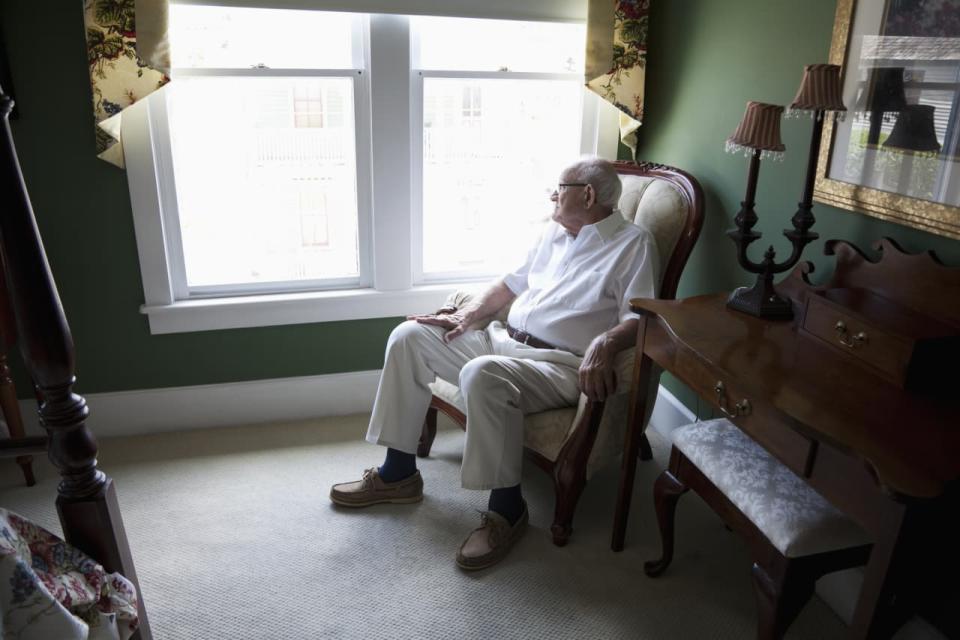My unmarried partner may need a nursing home. Who will pay for his care — and will I be able to stay in our home?

Most Read from MarketWatch
Stock market to face reality check when Fed updates its interest-rate forecasts
Nvidia reveals highly anticipated Blackwell chip lineup at GTC, but stock dips
AI brings existential crisis for Apple, Salesforce and tech’s old guard: Partner or perish
Dear MarketWatch,
I am seeking information about a shared home that my partner and I co-own with rights of survivorship, and a subsequent beneficiary deed for four adult children from previous marriages.
We are in Arizona. If one of us needs to go into a nursing home, is the other safe in the home? Or would Medicaid come after the house?
I should note that my partner’s assets outside of the home are around $100,000. The home is worth around $600,000.
My assets are about 15 times those of my partner. Am I required to financially support him should serious disability occur? (We were previously listed as domestic partners for insurance purposes prior to receiving Medicare two and a half years ago.)
Would Medicare assist in the costs for his care? Would it make sense to put most of my assets into a trust? Most assets are in a traditional IRA and a 401(k).
Dear Reader,
Long-term-care planning can be tough — and scary. The short answer: It sounds like your home is safe, but that doesn’t mean you shouldn’t do more long-term care planning to be extra sure.
First, let’s clarify: Medicare is the federal health insurance individuals are eligible for beginning at age 65, but they pay for their own healthcare through copays and deductibles upfront. The program does not assist very much in long-term care costs, except for a few very specific circumstances. Medicaid is a joint federal and state program for low-income individuals who can’t afford healthcare, and in situations regarding long-term care, such as residence in a nursing home or memory care institutions, the agency picks up the tab.
In Arizona, the Medicaid beneficiary or the co-owner of the home (usually a spouse) must live in the home in order for the house to be exempt from the applicant’s assets.
If no one was living in the house, the applicant must have an “intent to return,” which is, as you could guess, the intention to move back into the house. This is not your case, but it might be for a fellow reader so it’s worth mentioning.
Also, if no one is living in the house, the applicant can have a maximum home equity, which is the value of the house minus any debts against it, of no more than $713,000 in 2024, according to Medicaid Planning Assistance.
The estate recovery process is more of a pressing concern. In that case Medicaid would only try to get back the money it spent on your partner’s medical bills. The federal government requires each state to try to recover some of the funds spent on a beneficiary’s care, so they look at that person’s assets (including the home) after death. Typically in cases for married couples, nothing is touched until after the second spouse dies. It is important to note, however, that your titling structure (rights of survivorship) was a good choice in this instance.
Rules in Arizona
“[The] AHCCCS’ claim is filed only against the ‘estate of the individual,’” according to the Arizona Health Care Cost Containment System, which is Arizona’s Medicaid agency. “A home that is solely owned by the ALTCS member, is owned jointly without right of survivorship, or is owned jointly with right of survivorship but the joint owner is deceased, is subject to small estate affidavit or probate, and is therefore subject to payment of AHCCCS’ claim against the estate.” Estate recovery applies to anyone who received benefits under ALTCS or Home and Community Based Services (HCBS), was 55 or older when benefits started and is deceased, according to the AHCCCS.
The program may try to recover your partner’s assets outside of the home.
Let’s be clear — it is always good to run your specific case by a qualified, trustworthy estate planning or eldercare attorney in your state. The information in this letter is just the beginning of your planning, and a professional in your locality will be able to spot particular circumstances or know overlooked details based on your personal situation.
As for your own assets, it does make sense to get estate-planning documents in order, for your own protection should you need long-term care, and also for your beneficiaries if leaving behind a legacy is important. You can shop around for an attorney in your state, who will know what documents will keep your assets secure and your wishes met, in order to compare costs and processes these professionals may suggest. This includes a will and healthcare proxy, but it might also incorporate trusts, as you asked. In the meantime, check that all of your paperwork lists beneficiaries or are payable-on-death, so that they avoid probate.
It doesn’t hurt to run your situation by an experienced Medicaid expert in your state, either. ALTCS offers a free consultation to clients for finding care or filling out the application for the service, and does offer more extended assistance (but you’d have to pay for that).
